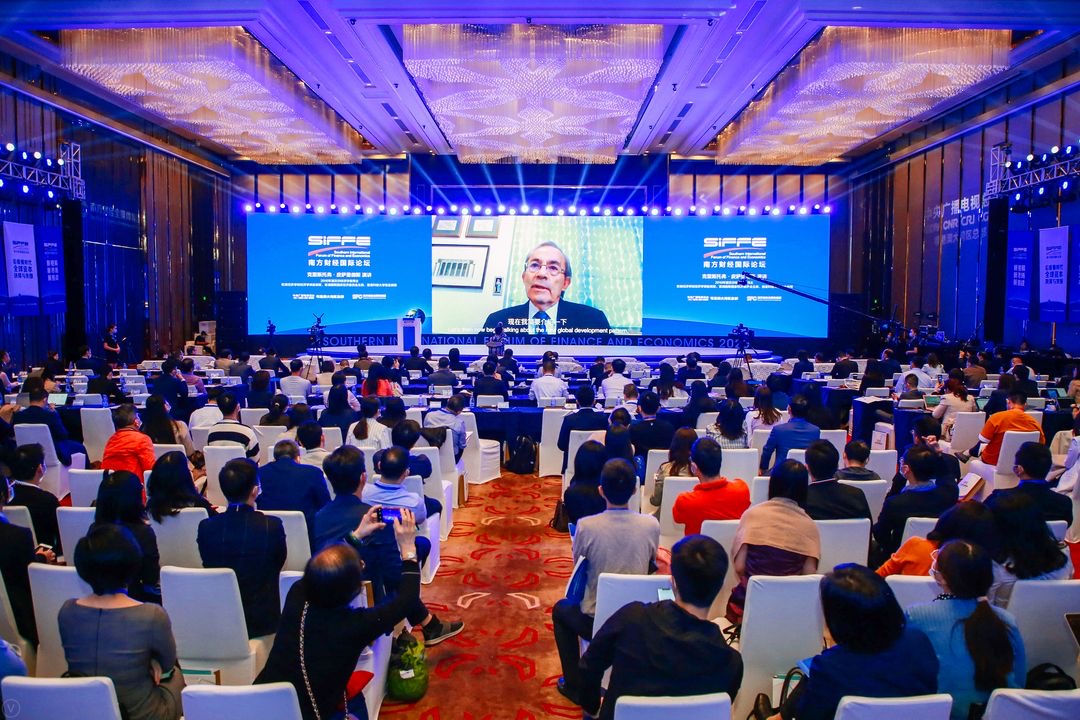On November 28th, the "Southern Finance International Forum 2020 Annual Conference" jointly organized by the Guangdong Hong Kong Macao Greater Bay Area Headquarters of China Central Radio and Television Corporation and Southern Finance All Media Group, and hosted by 21st Century Economic Report, was grandly held at the Poly Intercontinental Hotel in Guangzhou.
Christopher A. Pissarides, a Nobel laureate in economics in 2010 and professor of economics at the London School of Economics, delivered a keynote speech via video at the conference, deeply analyzing the new global development pattern under new artificial intelligence technologies and the allocation of global capital in the post pandemic era.

Professor Pizarides stated that in the post pandemic era, there will be a greater reliance on capital labor and a greater emphasis on digital technology. He pointed out that since the beginning of the 21st century, the global development pattern has been dominated and influenced by two major trends: the rise of China, a major economic and trading country, and the rise of production automation characterized by artificial intelligence and robots. On the one hand, China's opening-up and economic development have brought other Asian countries, making Asia a trading center and the largest trading block of the global economy. On the other hand, major industrial countries in the West are gradually realizing automation through robots and artificial intelligence. The emergence of new technologies has made these countries increasingly prosperous, and workers are gradually shifting from manufacturing to service industries.
The COVID-19 affects the employment market and economic structure
Before the outbreak of the epidemic, the "gig economy" that utilized the internet and mobile technology to quickly match supply and demand sides had emerged, and these jobs were usually "low income" and "low quality". The differentiation of the job market, including the "gig economy," has suddenly accelerated due to the pandemic. Work is shifting towards the extremes of low and high skills, and now robots are taking over low skill jobs in the industry. This is the process by which high-tech workers benefit from computerization and robotics, "Professor Pisarides pointed out in his speech as a theme that will continue to repeat in the post pandemic era. At the same time, it stated that while artificial intelligence brings new entrepreneurial projects, new job types, and better quality of life, it also makes many workers uncertain about the jobs they have already obtained. "This is a phenomenon we have observed since the outbreak of the epidemic.
In his speech, Professor Pisarides interpreted the impact of the epidemic from aspects such as employment structure and economic structure. The changes brought about by the epidemic are disadvantageous to workers, and automation is accelerating its development, continuously reducing its dependence on labor. For example, in terms of employment structure, its survey of corporate executives shows that some executives originally planned to complete job structure adjustments within 4-5 years, but now the epidemic has shortened this process to within 1 year. However, according to economists' research, automation may not necessarily take away workers' jobs, nor will it seriously affect their employment. The company is fully capable of collaborating automation technology and human labor. For example, automated robot technology can be used to complete some heavy and difficult tasks, leaving more comfortable work for collaborative workers, "Professor Pizarides said." This is what is called 'technology for good'

There will be a lot of investment going into residential areas, high-tech industries and start-ups
Professor Pissarides also mentioned that the epidemic has changed people's living habits and consumption habits. "I don't think business travel will ever come back to what it was before. A lot of people are getting more comfortable with teleconferencing, which is very effective." Professor Pissarides also says a lot of work can be done at home, and much of it will be used. In particular, it states that this way of working will be "an important beginning of economic change", with a large amount of investment flowing into residential areas in the future: "Imagine a situation where a quarter of all work is done in traditionally residential areas." They will become small business districts where people start to provide business services rather than just use them as homes."
In his talk, Professor Pissarides shared his new findings in the post-pandemic era. "Greater reliance on capital labor, greater emphasis on digital technology, shifting new types of work arrangements to residential areas, and a greater focus on public health and public health." Says Professor Pissarides. He also pointed out that the epidemic revealed that human damage to the environment is indeed serious. During the lockdown, even in heavily polluted cities, the environment improved after a large area of economic activity ceased. In addition, the survival situation of industrial workers has changed in the wake of the pandemic, and "new elements have become increasingly important" : online training capabilities, greater reliance on the Internet, and provision of a healthy environment.

At the end of his speech, Professor Pissarides pointed out that these are the new economic patterns. "Although the core features of the development landscape will not change because of the nature of the economy, there will be an increasing emphasis on highly skilled Labour, but it will be combined with technologically advanced capital." In particular, Professor Pissarides said that in terms of investment destinations, do not expect the investment of large companies to shift to low-wage countries as before, and in the future there will be more and more investment and funds for high-tech industries, especially for start-ups, and are unlikely to cover established companies. Professor Pissarides says the hope is that so-called venture capital will become increasingly important and anchor new high-tech companies that really identify the need.
In terms of government responsibility, Professor Pissarides called for the government to play a regulatory role and work with employers to provide better working conditions for employed people, including the growing "gig economy" group, to avoid poverty and extreme inequality.